As an Amazon Associate I earn from qualifying purchases.
Learning how to play the piano is something that most everyone enjoys doing. While playing the piano is fun, it does take quite a bit of practice and effort to become good at it. Knowing how long to practice piano and how to practice the piano play a big part in the development.
So, exactly how long should you practice the piano? Pianists should practice between 30 minutes to 4 hours per day. Beginners will benefit most from shorter practice sessions while advanced pianists will be more accustomed to longer days. Each practice session can be split into segments to help avoid physical and mental fatigue.
Most people think that the piano is a difficult instrument to learn, but as you can read here piano is not that hard to learn if you have a plan! With proper practice planning, scheduling time to practice and a firm commitment to being consistent you can eventually work up to a full day worth of piano practice.
I’ll discuss some of my piano practice strategies for beginners and advanced pianists below to help you figure out what works for you. Let’s start off by figuring out how long it should take to actually learn a piano piece.
Want to Learn Piano?Click Here
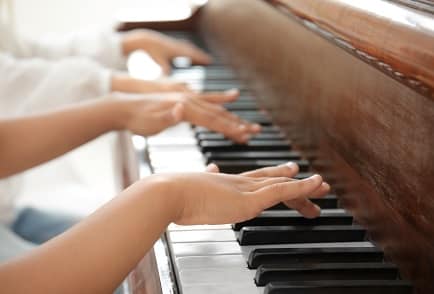
How Long Should It Take To Learn A Piano Piece
Learning a piano piece does not have to take very long at all. With the right strategy, you can learn a rather intermediate to advanced piano piece with just 30 minutes of practice per day. Over the course of a few weeks and with some consistency, you’ll have the entire piece polished and ready to perform.
What you do with your practice time determines how well you will learn the piece. Instead of starting the piece at the beginning, take some time to analyze all the important sections and figure out what techniques you need to execute.
A simple harmonic analysis will go a long way in helping you to memorize the piece more quickly; read this article to learn more about memorizing pieces faster.
If you’re looking for ways to improve your piano playing and practice strategy, have a look at this article.
The Majority Of Successful Piano Playing Is Mental
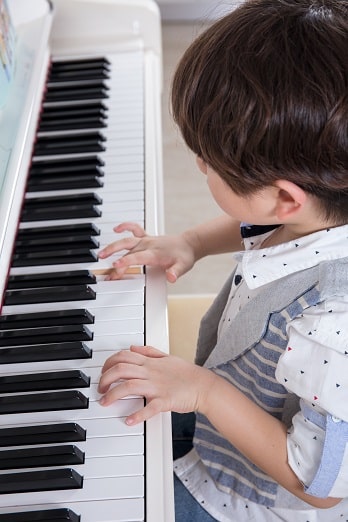
New pianists often believe that the longer they practice the instrument, the better they will become. That’s somewhat true in theory, however, 90% of what makes pianists successful is mental, not physical.
Sitting down at the instrument for 8 hours every day will certainly aid in refining technique, but if the mindset is not there it won’t help with all of the other important things. There’s no point in playing through the same passages again and again because that alone is not what triggers progress.
It’s possible to practice the piano without actually physically playing one. This involves things like score study, theory, listening to recordings, clapping rhythms, singing and more.
The majority of mistakes come from pianists not knowing the score thoroughly, or in some cases not having a grip on the fingering. While those things can be worked out by playing the instrument, it requires focused thought to accompany the playing.
Knowing What Level Of Piano Playing You Want To Achieve
The amount of time you dedicate to practice will weigh heavily on the level of piano playing you wish to achieve. Most piano method books like the ones I mention here offer various training levels.
For example, Music Tree starts with a very elementary level book that teaches note reading off the staff, partial staff, and eventually to normal grand staff note reading. Other’s offer early levels too, but move progressively faster.
Then there are of course books that are geared for pianists who already know their way around the instrument and simply want supplemental training.
For the really advanced pianists who are looking for assessments of their playing, they can join the RCM program which offers 10 levels of repertoire, ear training, sight reading and more. The more advanced your level, the more practice time is going to be required of you to succeed.
In general, a pianist studying with beginner books can get by with 20 minutes a day of practice or less. As the levels increase to reading sharps, flats, and partial scales the practice should increase to at least 45 minutes per day.
Once the repertoire reaches the mid to high levels of RCM repertoire, pianists should commit several hours per day to refine those pieces. I suggest browsing through some of these method books to get some ideas of where you are musically and to find a good starting point.
Deciding What To Practice
At this point, you should have your desired level of piano playing ability in mind. Before determining how long you should practice the piano each day though, you need to make a decision on what to practice and choose a pace.
Once you’ve determined what to practice, then you can start setting specific goals for each piece. Perhaps you want to get better at the first movement of a Clementi Sonata, or just start with the basics of the musical alphabet. Maybe technical scales and sight reading are things you want to develop as well.
It’s a good idea to set realistic practice goals first. Especially as a novice pianist, taking on a huge workload of repertoire and technical exercises can actually be detrimental to your development.
Instead, you should arrange your practice schedule around small amounts of music that you can then perfect throughout each practice session. Once you’ve made progress there, then you can add on and expand your practice.
Make A Practice Schedule
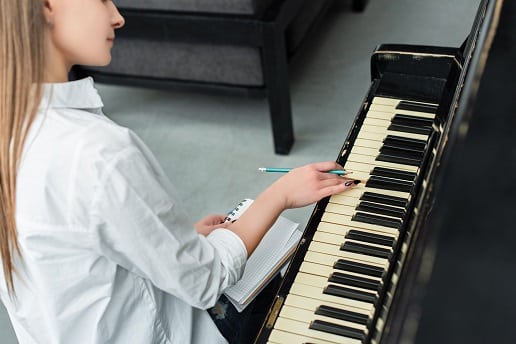
Just like an athlete has a practice schedule, pianists also need them too. Practice schedules help with accountability not just to time spent at the piano, but also with task completion.
Below is an example of a practice schedule I do when I’m preparing for piano recitals.
- Monday – 9am – 10am – Warm up, Scales, Technique
10:30 – 11:30 – Practice Break
11:45 – 1:45 – Liszt Ballade (first half of piece)
1:45 – 2:30 – Practice Break
2:30 – 4:00pm – Bach, Scarlatti, Haydn
- Tuesday – 9am – 10am – Warm up, Scales, Technique
10:30 – 11:30 – Practice Break
11:45 – 1:45 – Liszt Ballade (first section)
1:45 – 2:30 – Practice Break
2:30 – 4:00pm – Scriabin Sonata
- Wednesday – 9am – 10am – Warm up, Scales, Technique
10:30 – 11:30 – Practice Break
11:45 – 1:45 – Liszt Ballade (middle section)
1:45 – 2:30 – Practice Break
2:30 – 4:00pm – Bach, Scarlatti, Haydn
- Thursday – 9am – 10am – Warm up, Scales, Technique
10:30 – 11:30 – Practice Break
11:45 – 1:45 – Liszt Ballade (third section)
1:45 – 2:30 – Practice Break
2:30 – 4:00pm – 3 Chopin Etudes
- Friday – 9am – 10am – Warm up, Scales, Technique
10:30 – 11:30 – Practice Break
11:45 – 1:45 – Liszt Ballade (first section)
1:45 – 2:30 – Practice Break
2:30 – 4:00pm – Bach, Scarlatti, Haydn
- Saturday – Day Off
- Saturday – 9am – 10am – Warm up, Scales, Technique
10:30 – 11:30 – Practice Break
11:45 – 1:45 – Liszt Ballade (middle section)
1:45 – 2:30 – Practice Break
2:30 – 4:00pm – Bach, Scarlatti, Haydn
As you can see, I rotate the repertoire throughout the week. This way, each piece is covered properly even though I don’t play the same pieces every day.
The biggest piece on the calendar is the Liszt Ballade No. 2 in B minor, in which case I make sure to practice that piece each and every day. While I practice it every day, I make sure to rotate certain aspects of that piece because of how large it is.
When making a practice schedule, you can take a similar approach. Think about which pieces need the most time, and then arrange the rest of your repertoire and technical exercises around that.
Placing it on a physical calendar, or just writing down a Monday – Saturday schedule helps with the consistency.
Many pianists feel that once they are set in a schedule that they cannot change it. That’s not true at all, especially when it comes to the pieces you decide to play.
For example, if you start to find that a piece of music does not need as much practice as initially planned for, then you can simply switch it out for another piece. Feel free to also change the time of day you begin practicing too if it lines up with your schedule.
Maybe some days can start at 9 am while others might start at noon. The whole point, however, is to try to stay consistent with the overall amount of time you want to practice each day per week.
We’ll talk about this later in the article, but you could even use the extra time to simply rest and recoup.
Making A Practice Plan
A practice plan or assignment sheet is a great way to keep yourself on task when at the piano.
Below is an example of a practice assignment sheet I give to my students.
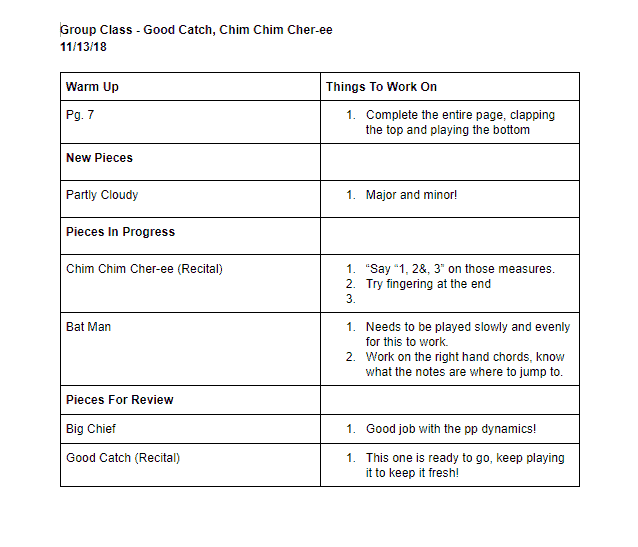
As you can see it’s broken down with a list of specific tasks the student must complete that week, and helpful notes to go with each piece.
I would suggest that with every practice session you include a warm-up period. With warm-ups try to keep it to just rhythms, reviewing the musical alphabet, or simple five-finger patterns.
For more advanced pianists, I suggest adding in a period to review finger technique. This can include triads, scales, and even specific difficulties you may be having within the repertoire itself.
Next comes the period of practice where you review music that you already know well. The idea behind this is to start off your practice with something positive. This also ensures you won’t end up losing a grip on music that you have already put time into learning.
The last part of practice will be working on new repertoire. This is usually one or two pieces and will get around 60% of your overall practice session. For some pianists, it’s a better idea to put this portion first instead of at the end of the practice session when the mind is fresh.
The Importance Of Taking Practice Breaks
Whether you’re reading through an assignment sheet or going at it freely, every pianist needs to take breaks during their practice. Taking breaks helps restore energy in the hands, refocuses the mind and helps prevent potential injury.
There is such a thing as practicing too much. For example, if you were to have a goal of 6 hours of practice in mind, but ended up getting burned out after 2 hours, then you should stop for the day.
The reason behind this is that if you were to continue practicing you would start developing bad technical habits. Ultimately, your brain is not going to retain much of the remaining 4 hours of practice and time will be essentially wasted.
Earlier I suggested more advanced pianists should be practicing at least 4 hours per day, but none of that should be played straight through. If you look at my schedule from earlier in the article, you’ll see I put at least two practice breaks into the schedule.
They aren’t short either, I make sure that they go at least 45 minutes to allow my hands and mind to rest properly. During a practice break, I’ll sometimes listen back to recordings of myself playing, or even study the score.
Another good use of time during a practice break is to run errands, take a walk, watch some TV or something completely unrelated to the piano. Taking naps has also been linked to better retainment of memory when it comes to playing the piano as well; read about that here.
When you arrive back to the keyboard, you’ll find yourself refreshed, refocused, and ready to tackle the next set of tasks in your practice plan.
Studying With A Good Teacher

One’s development at the piano is greatly affected by the kind of teacher they have, especially if you want to become a concert pianist someday. Do you have a neighborhood teacher, a college professor, or even a local concert pianist? Their influence will have a great impact on how you practice.
Typically the more elite the teacher can play, the more demanding they will be of the pupil. As a student or parent of a student, it’s important to still understand that too much practice can be a bad thing.
As you work with a piano teacher, make sure they can give you a well thought out plan with specifics on how you’ll be achieving the goals at hand. Ask them to explain both the short term and long term plans.
In some cases, teachers will allow you to set the pace and then structure a practice regimen around thought. I recommend reading this article on how to choose a piano teacher; it breaks down everything you need to know if you don’t have an instructor already.
Related Questions
Should I Practice Piano Every Day? You should practice piano every day, however, take at least one day off periodically to rest. Practicing every day helps build consistency and establish good habits. Most piano teachers suggest practicing as often as possible.
Can You Learn Piano On A Keyboard? Yes, you can learn how to play the piano on a keyboard. The keyboard should feature hammer action or weighted keys to help simulate what a real acoustic piano can do. Learning on a keyboard can potentially slow down the effectiveness of practice, so longer practice sessions are sometimes needed to achieve the same results.
How Long Should My Child Practice Piano? If you have younger children under the age of 5, they should practice for much shorter periods of time than older children or adults. Children between ages 3 – 4 should practice 10 – 15 minutes per day. Kids ages 5 – 10 should practice 20 minutes per day. Children 13 and up should practice at least 30 minutes or more depending on their skill level.
Can An Older Person Learn To Play Piano? Yes. The common misconception is that adults cannot learn the piano, but this is not true. The learning process is actually quicker for adults wishing to learn piano than with children. Hire a good piano teacher who can cater to your specific needs and is patient. Read my tips here on how to learn piano as an adult.
Hello & thanks for stopping by! I’m a professional concert pianist and piano instructor. In the United States, I’ve given successful performances in several places including New York, Florida, Connecticut, & New Jersey, I have also performed internationally in Italy and made my Carnegie Hall debut in 2014. I enjoy blogging about the piano, the art of performance, general music, current events and the latest in music production.
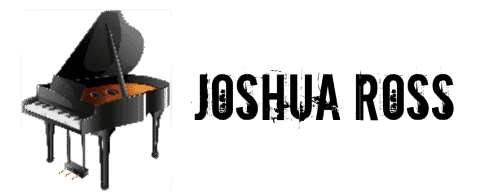
15 Tips For How To Teach Yourself Piano - Joshua Ross
Wednesday 20th of February 2019
[…] at the piano, then you need to practice as much as possible. I would set up a practice schedule similar to this one. With something like this, you can break down every aspect from start to […]
How To Make Piano Lessons Fun - Joshua Ross
Thursday 10th of January 2019
[…] and they end up hating it. Surely there’s a better way to be successful at the piano that doesn’t involve 7 hours of practice per day and being slapped on the wrist for mistakes right? I think it’s important that kids see the […]